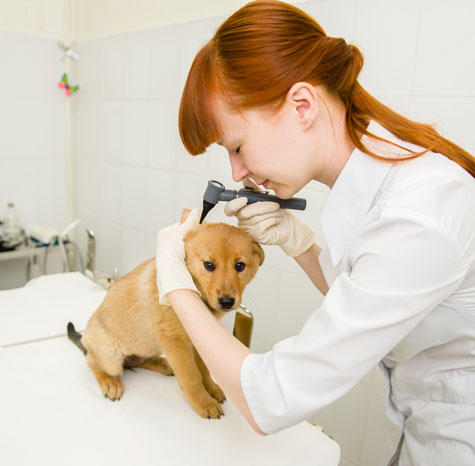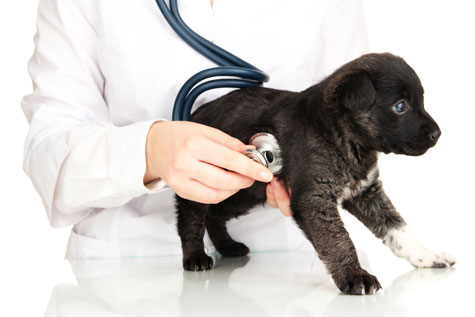Should You Vaccinate Your Dog?
Posted by Hot Dog COllars on 03/06/17 11:32 AM
With all the different stories in recent years about vaccines, let's be perfectly clear on this: Puppy vaccines are essential for a healthy pet. The sooner
you start your puppy on a regular vaccination program, the healthier and
happier your pet will be. While the rabies vaccine is required by law, the
other shots will also protect your new pet from disease. You can be sure that
regular vaccinations are healthy for your dog, and the possible side effects
are usually minimal.
Side Effects and Reactions
Some mild discomfort at the injection side is normal, and
should be expected. In some cases, your puppy may experience a slight fever.
Minor side effects usually go away on their own, but you should still watch for
signs of more serious reactions. Allergic reactions are relatively rare, but
have been associated with some vaccines. There may be some appetite loss and
sleepiness. Some of the more severe symptoms include swelling, gastrointestinal
problems, and difficulty breathing. Severe symptoms that include difficulty
breathing need to be treated as an emergency.
Initial Shots
 Puppies can receive their first set of shots at 6 to 7
weeks. Prior to this age, most puppies should have enough of an immunity from their mother's
milk. A puppy's first shots, known as DHPP, will include vaccines against
distemper and parvovirus, both of which are especially dangerous to young
puppies. The puppies are also vaccinated against parainfluenza and hepatitis.
The first deworming takes place at this time. At 9 to 10 weeks, puppies receive
a second DHPP and a second worming. The third DHPP takes place at 12 to 13 weeks,
along with a fecal exam. Puppies are usually given a bordetella, or kennel
cough, vaccine at this time. The bordetella vaccine helps give your puppy
better protection in case he or she needs to be boarded. These initial sets of
shots and treatments are essential to keeping your puppy healthy.
Puppies can receive their first set of shots at 6 to 7
weeks. Prior to this age, most puppies should have enough of an immunity from their mother's
milk. A puppy's first shots, known as DHPP, will include vaccines against
distemper and parvovirus, both of which are especially dangerous to young
puppies. The puppies are also vaccinated against parainfluenza and hepatitis.
The first deworming takes place at this time. At 9 to 10 weeks, puppies receive
a second DHPP and a second worming. The third DHPP takes place at 12 to 13 weeks,
along with a fecal exam. Puppies are usually given a bordetella, or kennel
cough, vaccine at this time. The bordetella vaccine helps give your puppy
better protection in case he or she needs to be boarded. These initial sets of
shots and treatments are essential to keeping your puppy healthy.
Spay/Neuter Surgery
Many veterinarians currently suggest having a puppy spayed
or neutered at the age of four months. This is before the first heat period for
most female puppies, and well before sexual maturity for males. Any puppy that
will not be used as part of an organized, responsible breeding program should
be spayed or neutered. Having your puppy altered serves several purposes. One,
it helps prevent puppies from being born that there may not be good homes for.
It also helps prevent problem behavior associated with intact animals that can
be a threat to the safety of other animals or people. Female dogs in heat are
more inclined to wander from home in search of mates, and unaltered males are
more likely to wander and fight with other males over females. Having a puppy
spayed or neutered as early as possible also prevents certain types of cancer
that affect the reproductive organs.
Rabies
The rabies vaccine is given at four months. It will often be
given while your puppy is having its spay or neuter surgery performed. A rabies
shot is required by law in all fifty states, and is probably the most important
vaccine that your puppy will receive. Rabies is a deadly virus that affects the
nervous system, and is spread through bites from an infected animal. It is
known to be incurable, and is in fatal in humans without prompt treatment.
Keeping dogs vaccinated against rabies is vital to the health and safety of the
community.
Heartworm Testing
 A heartworm test should be given when a puppy is six months
old. Although it is very common in areas with rainy climates and large numbers
of mosquitoes, dogs in more arid areas may also be affected. The test is done
prior to treatment because a different course of treatment is necessary if the
dog tests positive. If the dog tests negative, a heartworm preventative
medication is given every month afterward.
A heartworm test should be given when a puppy is six months
old. Although it is very common in areas with rainy climates and large numbers
of mosquitoes, dogs in more arid areas may also be affected. The test is done
prior to treatment because a different course of treatment is necessary if the
dog tests positive. If the dog tests negative, a heartworm preventative
medication is given every month afterward.
Annual Booster Shots
Your dog will require annual boosters for the shots that he
or she has already received. The DHPP is given on a yearly basis. It is
especially important when your pet comes into contact with other dogs on a
regular basis. The rabies shot is usually required by law on an annual basis.
Since rabies can affect humans, it's important for pet owners to keep this shot
current. The bordetella vaccine should also be updated at all times, especially
for dogs that are boarded on a regular basis.
Flea and Tick Treatments
You should always check with your vet about what the best
age is to start a puppy on flea and tick treatments. Most vets suggest regular
treatment on a monthly basis. Fleas can cause a lot of bothersome itching, and,
in the case of house dogs, can spread to your carpets and furniture. Bites from
fleas can also cause hot spots, which can become infected through persistent
biting and scratching. Tick infestations can cause anemia when they're severe
enough. Certain types of ticks can carry Lyme Disease or Rocky Mountain Spotted
Fever. Preventative medications may be in the form of topical medications
applied to the neck, or pills.
Parasites Exams
Internal and external parasites exams should be given on a
yearly basis. Dogs are susceptible to several types of worms that can have
damaging effects on their health. One possible way that worms can harm a dog's
health is by blocking parts of the digestive tract. Some worms that dogs can
contract are also contagious to humans. It's always a good idea to have your
dog examined for parasites, even if you are using a treatment program. Some
parasites don't respond to popular over-the-counter worming medications that
may work for other types of parasites. Know what the signs of a possible
infestation are, and alert your vet to any problems.
A regular vaccination and treatment schedule is good for
your dog's health, and should be maintained. Regular treatment against
contagious diseases protects your dog's health and will allow it to live a
longer life. Make sure your dog is scheduled for regular checkouts that could
alert you to possible health problems. Regularly vaccinated, altered dogs whose
owners are aware of key health issues make much better pets.

